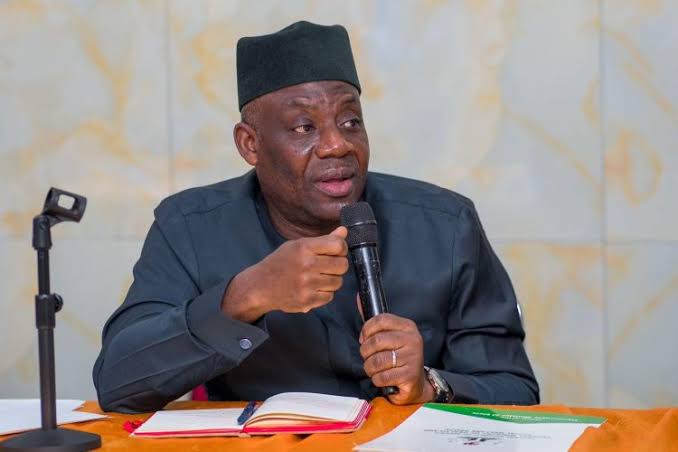FIFTY years is no small milestone for any institution. It represents half a century of resilience, adaptation, and commitment to a vision that transcends generations. For the Estate Surveyors and Valuers Registration Board of Nigeria (ESVARBON), which marked its golden jubilee recently, this milestone is a profound testimony to the enduring relevance of professional regulation, ethical practice, and the advancement of real estate management in Nigeria.
Established by Decree No. 24 of 1975, now known as the Estate Surveyors and Valuers (Registration, etc.) Act, Cap E13, Laws of the Federation of Nigeria 2007, ESVARBON has stood tall as the regulatory cornerstone of the Estate Surveying and Valuation profession in Nigeria. Its mandate, to determine who are Estate Surveyors and Valuers, to regulate the training, registration, and practice of the profession, and to maintain discipline among practitioners, has been carried out with remarkable dedication, even amid changing economic and institutional dynamics.
The history of the board cannot be told without acknowledging the visionary estate professionals who, in the early post-independence years, recognised the need for a statutory regulatory framework to guide the emerging real estate industry. Before its establishment, the practice of estate surveying and valuation in Nigeria was largely informal and unregulated. Only a few trained practitioners, mostly expatriates and early Nigerian surveyors, operated under British professional traditions.
The creation of the board therefore brought structure, credibility, and uniformity to the profession. It marked the beginning of organised professional regulation, ensuring that only qualified and registered individuals could bear the title Estate Surveyor and Valuer and engage in property valuation, real estate agency, land administration, and facility management.
Over the decades, the board has worked in tandem with the Nigerian Institution of Estate Surveyors and Valuers (NIESV), its sister professional body, to build a strong ecosystem for the growth and integrity of the profession. While NIESV functions as a professional association for members’ welfare and development, ESVARBON serves as the watchdog, enforcing compliance with ethical standards and protecting the public interest.
Since its establishment, the board has consistently maintained high regulatory standards, ensuring that real estate practice in Nigeria aligns with global best practices. Its achievements span four major fronts – registration, regulation, training, and discipline.
In the registration of practitioners, it has developed and sustained a transparent system for registering qualified estate surveyors and valuers. Through periodic screening, professional interviews, and practice examinations, it ensures that only competent and properly trained individuals are admitted into the register. Over the past five decades, the Board has registered thousands of professionals, many of whom now serve in both public and private sectors as valuers, property consultants, academics, facility managers, and developers.
In a country with a rapidly growing and dynamic real estate market, the board’s regulatory oversight remains crucial. The Board ensures that practitioners comply with professional standards in valuation, land administration, compensation assessment, and estate agency transactions. Its guidelines on professional practice, regularly reviewed to reflect current realities, provide clarity on scope of practice, valuation bases, ethical codes, and operational procedures.
Recognising that regulation must be matched with capacity building, the board has worked closely with tertiary institutions to accredit Estate Management programmes, thereby maintaining the quality of academic training for future professionals. Through Accreditation Panels, the Board evaluates the facilities, curriculum, and staff strength of universities and polytechnics offering estate management, ensuring that students receive sound theoretical and practical education.
Perhaps one of the strongest pillars of the board’s legacy is its commitment to discipline. The Investigating Panel and Disciplinary Tribunal have been instrumental in addressing professional misconduct and upholding integrity within the practice. By sanctioning erring members and maintaining public confidence, the Board reinforces the principle that professional trust is non-negotiable.
From the oil boom years of the 1970s through the economic turbulence of the 1980s and 1990s, and into the digital revolution of the 21st century, it has continued to evolve. The Nigerian real estate landscape has transformed significantly, with increasing urbanisation, housing deficits, land policy reforms, and the entry of global investors. Amid these shifts, the board has consistently adapted its strategies to remain relevant.
In recent years, the board has embraced digital transformation in its regulatory operations. The introduction of online registration portals, digital databases of registered professionals, and e-verification systems has simplified processes and enhanced transparency. The Board’s collaboration with government agencies, including the Federal Ministry of Works and Housing, National Universities Commission (NUC), and Bureau of Public Procurement (BPP), has further deepened institutional integration and policy relevance.
The board’s presence is also felt in public enlightenment. Through workshops, annual reports, and stakeholder engagement, it continually educates the public about the importance of engaging registered professionals for real estate transactions. This advocacy has significantly reduced cases of quackery and professional malpractice in the property sector.
One of the board’s most impactful contributions to national development is in the area of valuation for public purposes. The board’s oversight ensures that valuations for compensation, mortgage, insurance, taxation, and asset management are carried out by competent professionals whose opinions are credible and defensible. This trust in valuation reports underpins major financial decisions, infrastructural development, and government projects.
In addition, the board’s insistence on standard methodologies and ethical guidelines has helped stabilise the real estate investment environment in Nigeria. Investors, both local and foreign, rely on professional valuation reports to make informed decisions on property acquisitions, mergers, and portfolio management. By extension, this has contributed to the growth of the financial and housing sectors.
Despite its many successes, the board’s journey has not been without challenges. The persistence of quackery remains a major threat, with unqualified individuals and estate agents encroaching on professional terrain. The slow pace of judicial enforcement and inadequate public awareness sometimes make it difficult to prosecute offenders effectively.
In addition, funding and administrative bottlenecks have occasionally constrained the board’s operations, especially in conducting nationwide monitoring and institutional accreditation. The rapid technological changes in real estate practice such as the use of artificial intelligence in valuation, proptech solutions, and data analytics also demand continuous capacity building for both regulators and practitioners.
Nevertheless, the board has shown remarkable resilience. By leveraging partnerships, technology, and reforms, it continues to expand its regulatory scope. The Board’s recent emphasis on continuing professional development (CPD) ensures that practitioners remain up to date with emerging trends in valuation techniques, sustainable property management, and real estate finance.
The 50th anniversary celebration of ESVARBON is more than a ceremonial event; it is a reflection on five decades of institution-building and national contribution. The celebration brought together past and present leaders of the profession, government officials, academics, and private sector stakeholders. It was a moment to honor the founding fathers, recognise the contributions of past registrars and board members, and project a renewed vision for the next fifty years.
The golden jubilee theme, “50 Years of Excellent Regulation of Real Estate Practice in Nigeria,” aptly captures the essence of the Board’s enduring relevance. The celebration also featured exhibitions, lectures, and award presentations to distinguished professionals who have upheld the values of excellence, integrity, and public service.
Indeed, the board’s half-century journey symbolises professional maturity, national service, and the triumph of ethics over expediency. The Nigerian real estate sector has expanded in scale, sophistication, and investment value, but remains the custodian of professional credibility.
As the board steps into its next half-century, the challenges and opportunities ahead are both vast and dynamic. The Nigerian real estate market is projected to grow exponentially, driven by urbanisation, housing demand, and infrastructural development. This future calls for a more digitally enabled, research-driven, and policy-engaged regulatory framework.
To maintain its leadership, ESVARBON must continue to deepen collaboration with academic institutions to promote research and innovation in valuation practice, expand its digital regulatory infrastructure, ensuring real-time monitoring and compliance, intensify public awareness campaigns against unlicensed practitioners, as well as strengthen international partnerships with organisations like the Royal Institution of Chartered Surveyors (RICS) and the International Valuation Standards Council (IVSC) for global recognition.
Promote sustainable valuation practices aligned with green building standards and environmental responsibility.
The board’s commitment to excellence must now integrate sustainability, technology, and inclusivity as central themes. The next generation of Estate Surveyors and Valuers will rely on ESVARBON not only for regulation but for leadership in shaping a transparent and resilient real estate sector.
For 50 years, ESVARBON has embodied excellence in regulation, professionalism, and ethical leadership in Nigeria’s real estate industry. From its humble beginnings in 1975 to its digital transformation in 2025, the board has remained steadfast in ensuring that the practice of estate surveying and valuation meets the highest standards of competence and integrity.
As the board celebrates its golden jubilee, it stands not just as a regulatory body, but as a symbol of professional trust and public confidence. Its legacy continues to inspire the younger generation of estate professionals and strengthen the foundation upon which Nigeria’s real estate future will be built. Indeed, the board at 50 is not just a celebration of the past, it is a bold reaffirmation of a future anchored on professionalism, discipline, and sustainable development.
Adedeji Ogunwolu is an Estate Surveyor and Valuer in Lagos.






